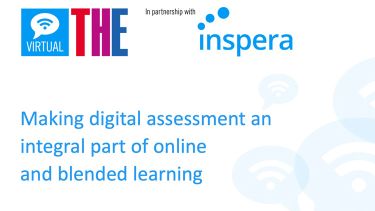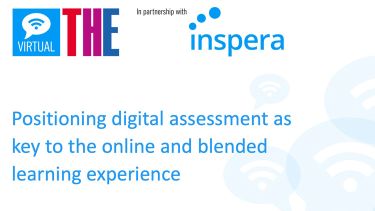The University of Bath offers a convincing case study as to why higher education’s digital transformation cannot afford to overlook assessment
While universities have shifted wholesale towards modes of online learning, we have yet to see a similar move to digital assessment. There are many reasons for this, not least concerns around cheating, but advocates of digital assessment believe that such concerns are outmoded and the time has come for higher education to look beyond the traditional handwritten exam.
At a webinar hosted by Times Higher Education in partnership with Inspera – which has been providing digital assessment services since 2008 – Professor Donald Lancaster, director of studies for the executive MBA at the University of Bath, shared his insights into the process, with Bath having started the shift to digital assessment in 2017.
“Handwritten exams persist in most educational establishments because of outdated reasons of security and fairness,” said Lancaster. “There is a huge dependence on large venues, on furniture, on invigilators – big establishment costs, logistical nightmares. We can be much more flexible with digital exams.”
The University of Bath launched 18 pilots, each with different cohort sizes, disciplines, devices and summative and formative assessments. Once the system was stress-tested, it could be scaled up. In one pilot, the university assessed 193 students in five different venues. It was crucial that staff and students alike were provided with adequate training. Student concerns often centred around laptop power and wi-fi connectivity, but Lancaster said that these concerns could be addressed via lectures and support from staff.
“Students learn best when they are focusing on learning,” he said. “Distractions get in the way, so whether in learning or assessment modes, it is really important to minimise unfamiliarity. We want to minimise their anxiety about handwriting. They are anxious and we are anxious as faculty. Students are used to using their own machines; they are much more used to that than using pencil and paper. They are familiar with the editing tools that they use all the time. Copying and pasting, reordering, bullet points. You can’t do that with handwritten exams.”
Lancaster spoke of “increasingly sophisticated” modes of invigilation. The integrity of the digital exam is not in question. Neither is its potential to enhance the student experience. Once Bath had trialled the new exam format, leaving resource-intensive paper examinations behind proved popular among students and staff. “Inevitably, everywhere you go there is going to be a resistance to change,” he said. “Expect that, but overcome it by testing and training.”
Watch the webinar on demand above or on the THE Connect YouTube channel.
Find out more about Inspera and higher education.















